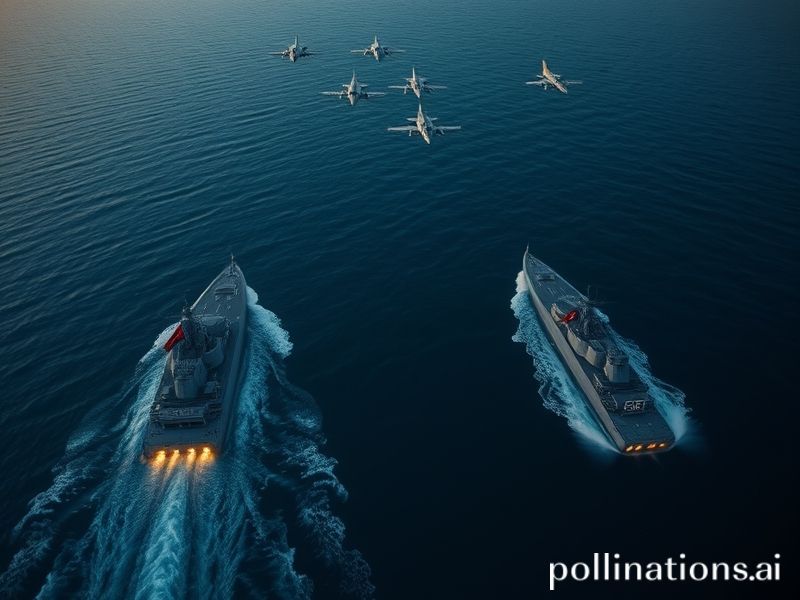Aegean Tinderbox: How Greece vs Turkey Keeps the World’s Geopolitical Drama on Eternal Summer Rerun
Aegean Tinderbox: Greece vs Turkey and the World’s Favorite Never-Ending Soap Opera
By Correspondent-at-Large, Dave’s Locker
There are two kinds of geopolitical feuds: the ones that end in mushroom clouds, and the ones that merely smolder for centuries like a cheap incense stick, periodically singeing the furniture. Greece versus Turkey is firmly in the second category, a Mediterranean telenovela with better beaches and worse dialogue. Yet every time the embers flare, the rest of the planet looks up from its own dumpster fires and reaches for popcorn. Why? Because Athens and Ankara are the quarreling heirs to a civilization that once taught the world how to write tragedies—only now they perform them on NATO’s front porch, with gas rigs instead of masks.
The latest episode—airspace violations, F-16 shadow puppets, and a maritime-map duel worthy of drunken cartographers—arrives just as the global order is busy elsewhere: America is auditioning for its next constitutional crisis, Europe is rehearsing winter without Russian gas, and China is wondering why anyone would bother with islands when you can simply buy entire ports. Into this vacuum, the Aegean rivalry offers a comforting nostalgia: a good old-fashioned border spat where the stakes are low enough to tweet about but high enough to spike energy prices. Think of it as the Cold War’s off-Broadway revival, complete with vintage hardware and discount existentialism.
Energy, naturally, is the new Helen of Troy. Under the seafloor lie hydrocarbons that promise either prosperity or pollution, depending on your marketing deck. Turkey, whose currency is currently valued somewhere between Pokémon cards and thoughts and prayers, covets the bounty. Greece, still paying off its last decade of austerity, covets not being bullied out of the bounty. The EU stands behind Athens the way a cautious parent stands behind a toddler on a balance beam—arms out, insurance updated, secretly filming for TikTok. Meanwhile, Washington toggles between “strategic ally” and “fellow NATO member,” which is diplo-speak for “please don’t make us choose; we’re already polyamorous with the Kurds.”
Global markets, ever the dispassionate referee, have responded by adding a small but tasteful “Aegean risk premium” to every barrel of oil transiting the Bosporus. Traders in London and Singapore now price their morning coffee against the probability that two pilots will play chicken over a rock named after a goat. This is what passes for progress in 2023: algorithms hedging Homer.
The real significance, though, is architectural. NATO was built to keep the Germans down, the Russians out, and the Americans in—nobody drafted a clause for members who routinely scramble jets on one another. If Article 5 ever gets triggered by a dogfight over Kardak/Imia (pick your linguistic flavor), the alliance will discover whether collective defense covers friendly fire. The answer could determine whether NATO expands, fractures, or simply rebrands as a live-streaming platform for aerial acrobatics.
Further east, China and India watch the spectacle with the detached curiosity of students observing two professors duel over parking space. Beijing quietly notes that if the West can’t pacify a pair of democracies armed with U.S. hardware, the Belt and Road might need fewer roads and more aircraft carriers. New Delhi, meanwhile, calculates how many Russian S-400s Turkey could resell if Greece sinks them first. It’s globalization’s version of recycling.
Human nature, of course, remains the same regardless of GDP. Both nations still teach schoolchildren that the other side stole their yogurt. Both maintain museums whose gift shops sell identical evil-eye keychains, presumably to hex the purchaser’s neighbor. Tourists, the only demographic who profit from the feud, get two cuisines for the price of one tan. If only the UN served mezze instead of memos, we might declare world peace by dessert.
So what happens next? Probably nothing—until it does. Like an aging couple who file divorce papers every anniversary, Greece and Turkey will reconcile just long enough to sign another non-binding memorandum, then resume arguing over whose turn it is to host the next earthquake. In the meantime, the rest of us will refresh flight-tracking websites and place gentle wagers on which pilot had the better Spotify playlist.
Because in the grand bazaar of global politics, the loudest stalls rarely sell the best goods; they just keep the customers milling around. And as long as the Aegean stays warm enough for summer holidays but cool enough for fighter jets, the show will go on—renewed each season, sponsored by hydrocarbons and human folly, with free shipping on historical grievances worldwide. Sit back, order another frappe, and enjoy the drama. Just don’t forget sunscreen; the fallout is mostly rhetorical, but the burn is real.







